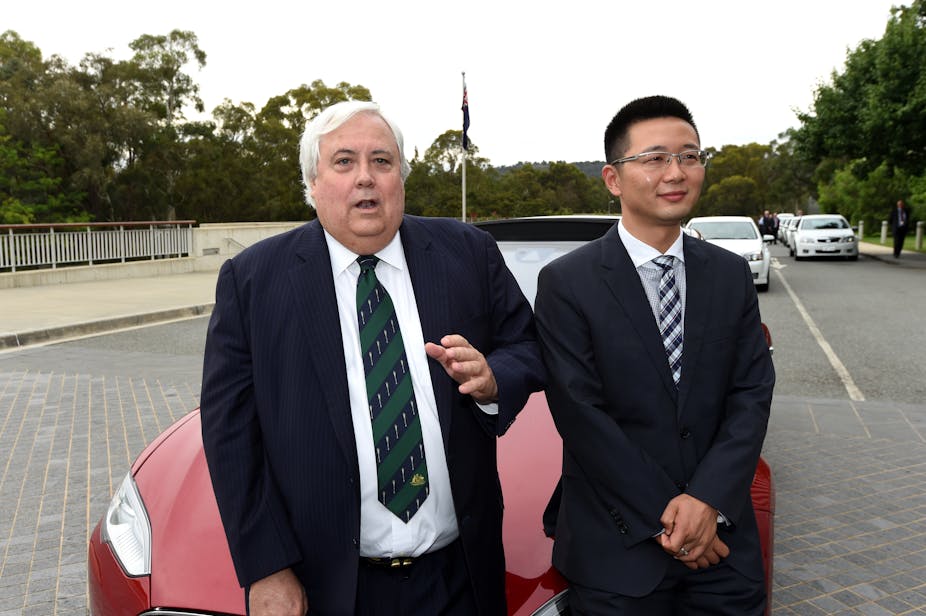The Palmer United Party (PUP) is now in a tiny kennel, which will be an interesting test of the relationship between the bombastic but diminished Clive Palmer and his lone Senate player, the understated and unassuming Dio Wang.
Wang, from Western Australia, who was managing director of a Palmer-financed company, is the only PUP left from the three who entered the Senate on July 1. The insurance policy Palmer took out to protect his upper house power – an alliance with Motoring Enthusiast Party senator Ricky Muir – has also evaporated.
Initially, in a Senate where the government needs six of eight crossbenchers when Labor and Greens oppose a bill, Palmer had a blocking vote of three, or four with Muir. With no power in the lower house where he sits as member for Fairfax, Palmer had plenty of bite in determining whether the Abbott government could get its program through parliament.
It was always thought PUP could splinter, but it’s remarkable it has taken under a year to do so.
First Jacqui Lambie bailed out to become an independent; now Glenn Lazarus has gone. And so, largely, has Palmer’s power.
Palmer will speak for nobody but Wang (assuming Wang allows) – that is, for just one out of the crucial eight votes. If Wang strayed off the PUP reservation, Palmer would become as irrelevant to national politics as one of his dinosaurs. But Senate independent Nick Xenophon warned against writing off Palmer’s influence, saying he has the ability to run campaigns and affect the outcomes in individual seats.
Palmer bought his clout by spending a huge amount of money; he was aided by being a novelty in this age of celebrity. But the investment could not tie Lambie and Lazarus to their political benefactor. Palmer was too capricious, and their Senate seats gave them power in their own right if they wanted to seize it.
While Lazarus resigned from PUP to become an independent after his wife was fired on Thursday from her party job, he said it had been “a very long decision”.
“It’s a difficult work world, the world of Clive,” Lazarus said on Friday.
“I don’t believe the way that the party’s been run and how it’s been handled is the right fit for me. I came from a background of rugby league, which was a team sport.”
Clive was bullying, and “a lot of requests, suggestions, just weren’t listened to … they just fell on deaf ears”.
Palmer’s style was shown recently when he issued a press release saying PUP would abstain on legislation until the the chaos around the Liberal leadership ended. Lazarus was particularly unhappy with this. It was never enacted – PUP senators voted later that day – and next day it was revoked.
Asked about the incident, Palmer says he consulted Lazarus by phone before putting out the release and he “didn’t object” to the move then.
Palmer and his PUPs stopped the government being able to proceed with key budget measures, including the Medicare co-payment, deregulation of university fees, a crackdown on the young unemployed, and indexation changes that would disadvantage pensioners. PUP preserved some of Labor’s climate change architecture and defended the renewable energy target.
How Lazarus’ defection, marking another stage in the disintegration of PUP, will affect the dynamics of the Senate and the government’s chance of getting its way will take a while to see.
On some or many things, the ex-PUPs will vote as they would have voted as PUPs. But a freer, more fluid crossbench should present the government with more opportunities – it is now dealing with eight separate entities rather than eight including a bloc of (most recently) two. On the other hand, it makes negotiations that much more complex.
The immediate interest is whether the PUP change will affect next week’s Senate outcome on higher education, now back second time round. It seems not. Lazarus tweeted: “While my party status has changed, my position on the higher education measures hasn’t. I can NOT support cuts”.
Wang has been more sympathetic but he reaffirmed on Friday that he will continue to oppose the legislation, which Palmer has strongly fought. Regardless of Wang, there are three apparently solid votes against – Lambie, Lazarus and Xenophon.
In becoming an independent Lazarus has shaken off the heavy hand of Palmer. But regardless of his stated position on the higher education legislation he might be in for a few days of fresh torment – from Education Minister Christopher Pyne, whom Lazarus accused last year of harassing him with text messages. Pyne pledged on Friday to “redouble my efforts” with both him and Wang “to see if we can gain the support we need”.
But careful, Christopher, no bullying please.

